Charles E W Bean, Diaries, AWM38 3DRL 606/244/1 - 1916 - 1933 - Part 1
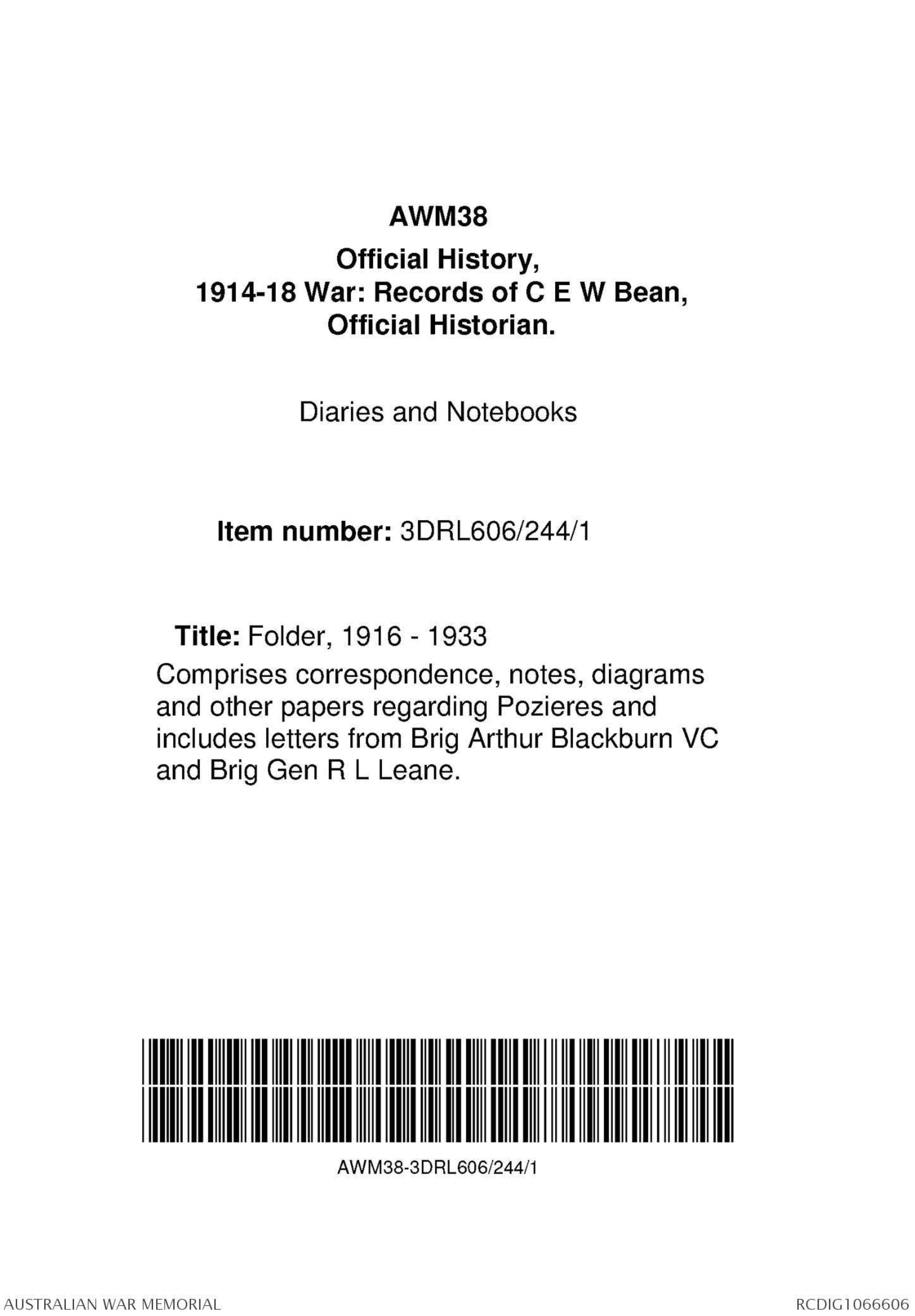
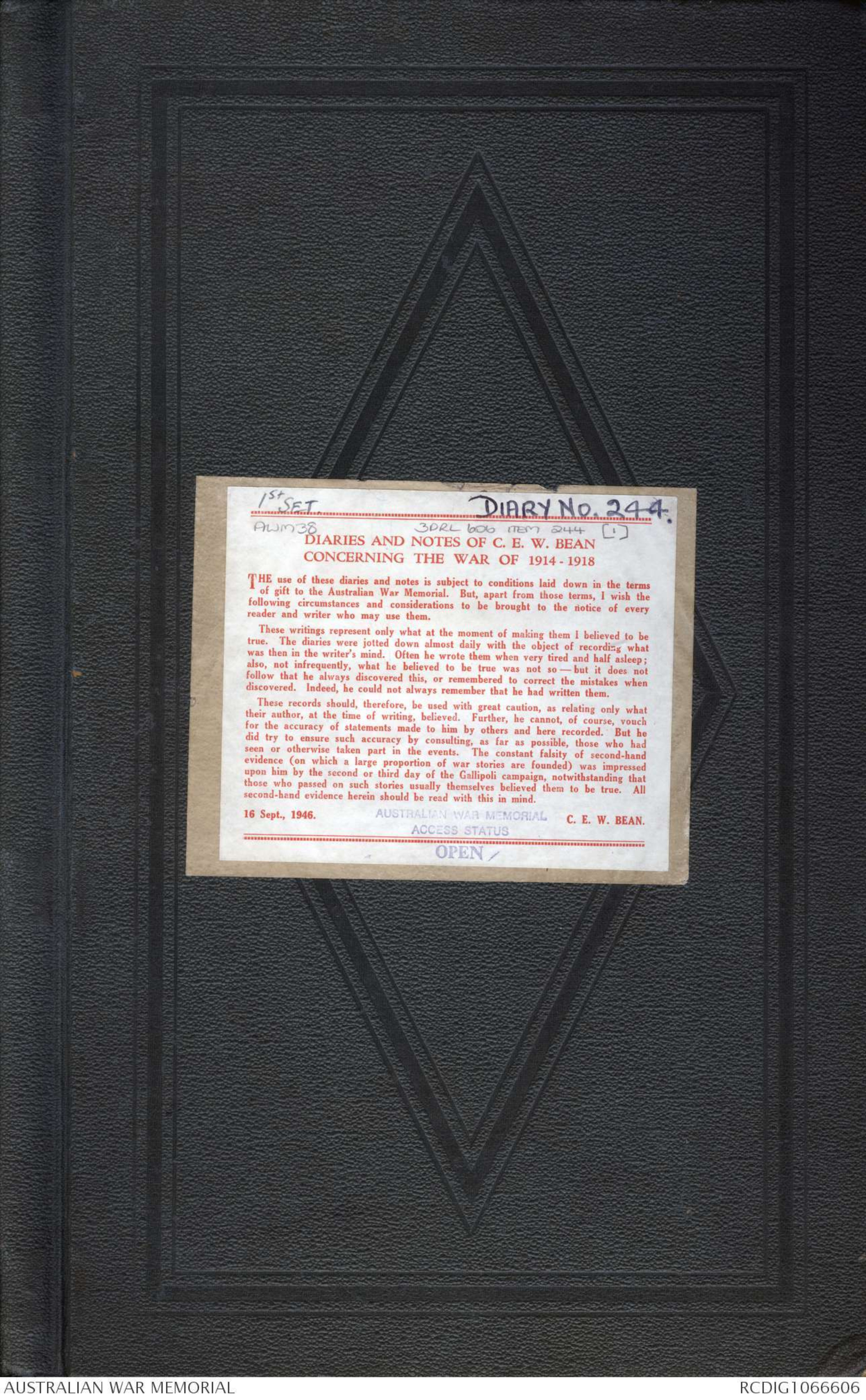
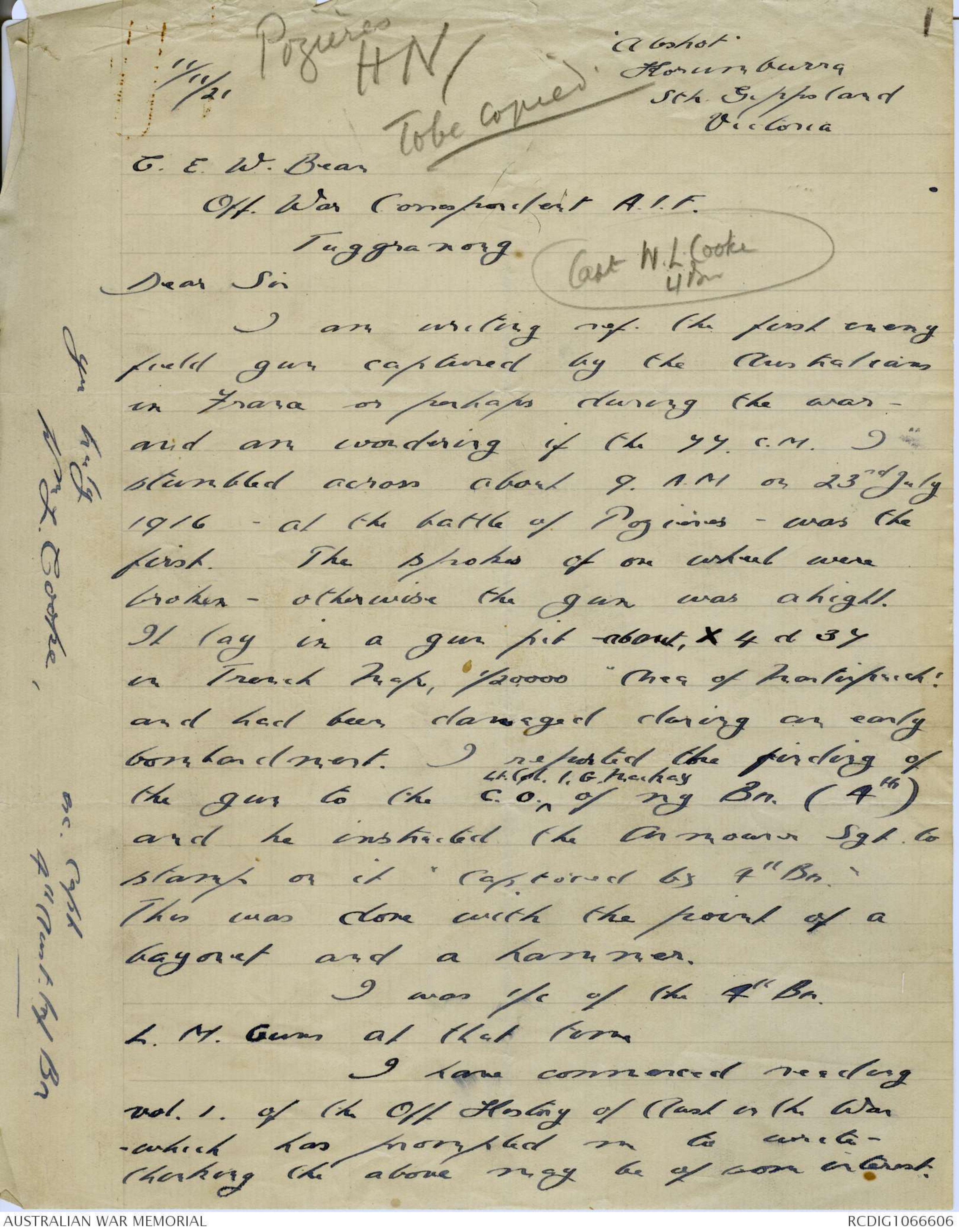
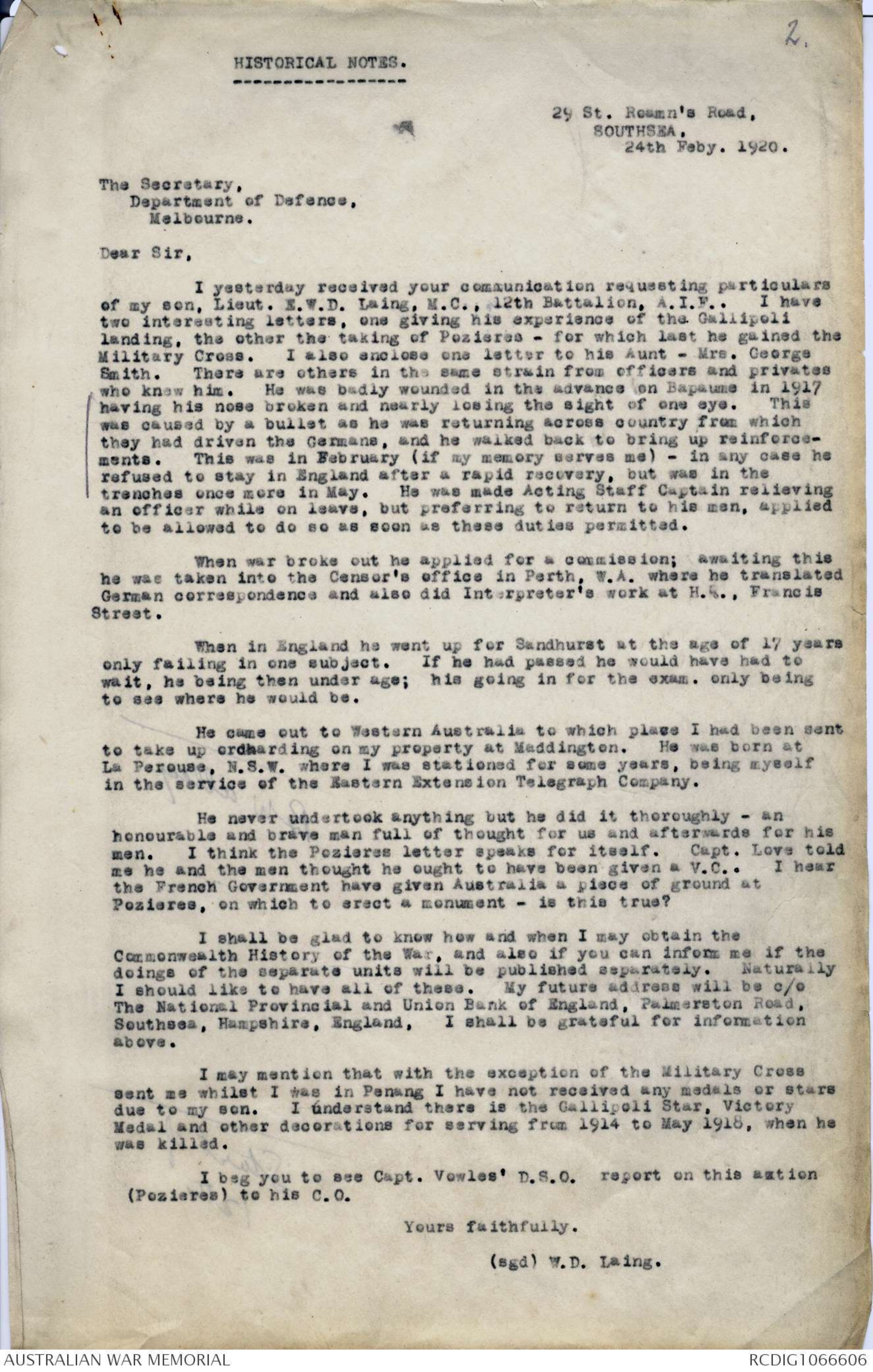
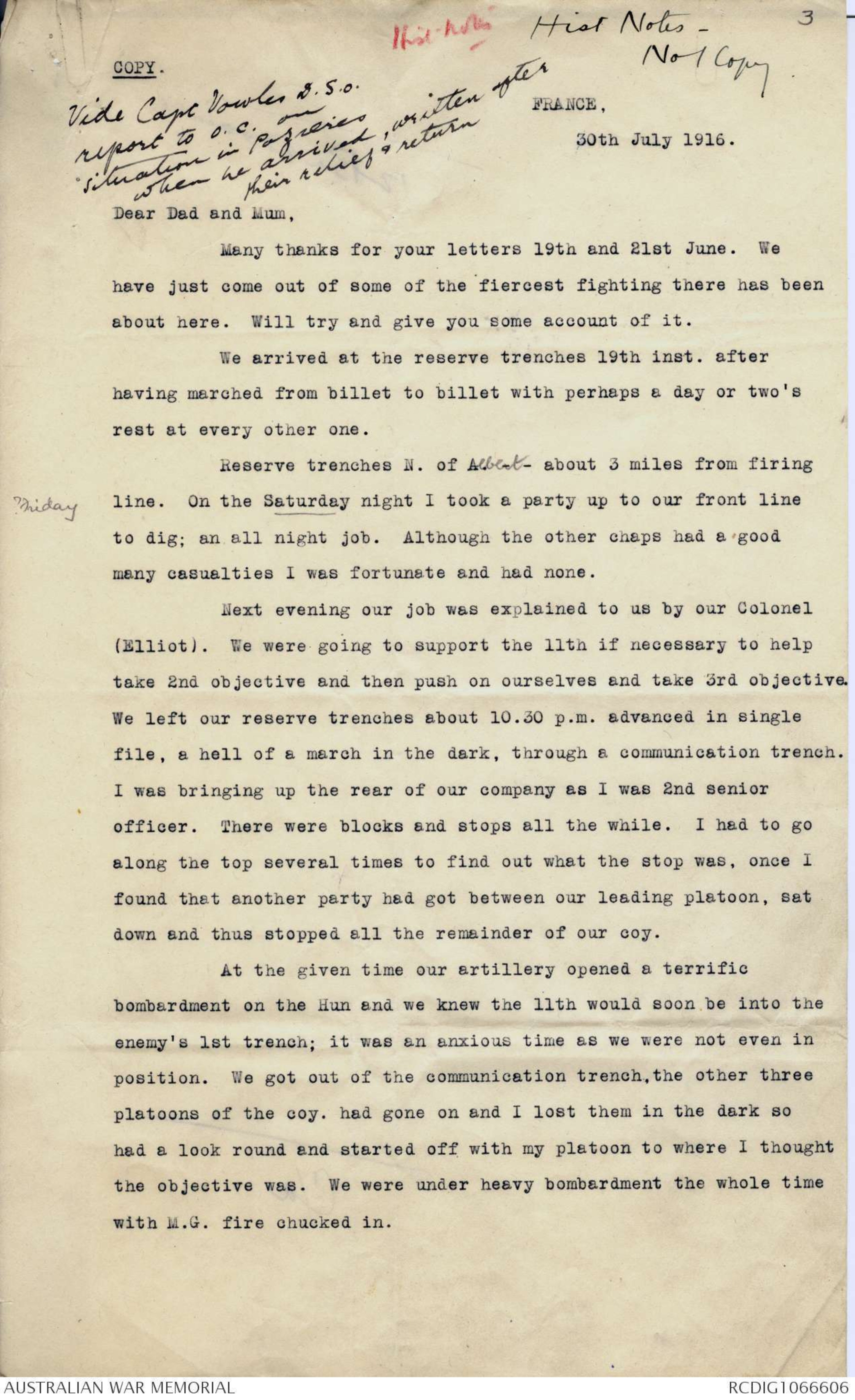
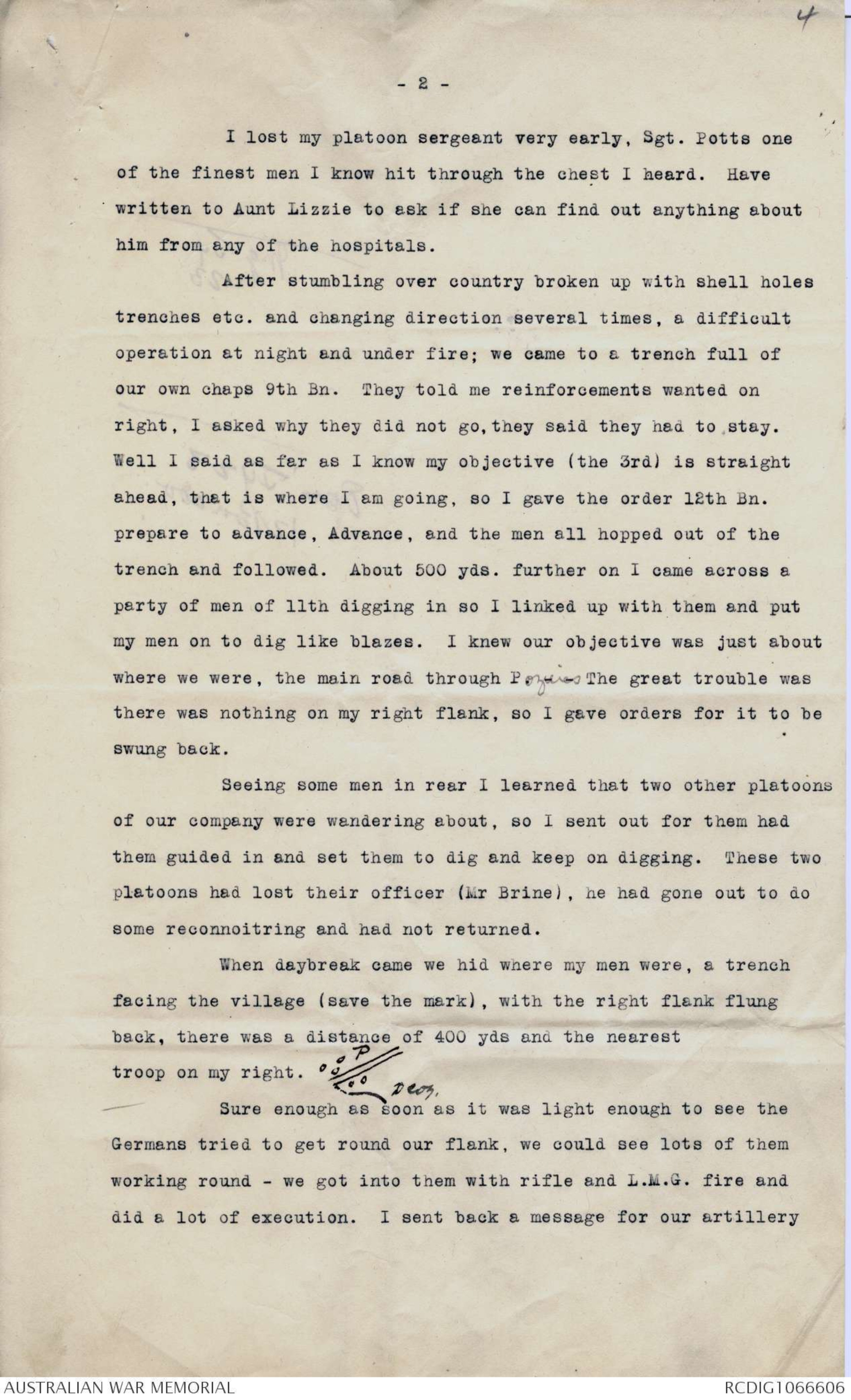
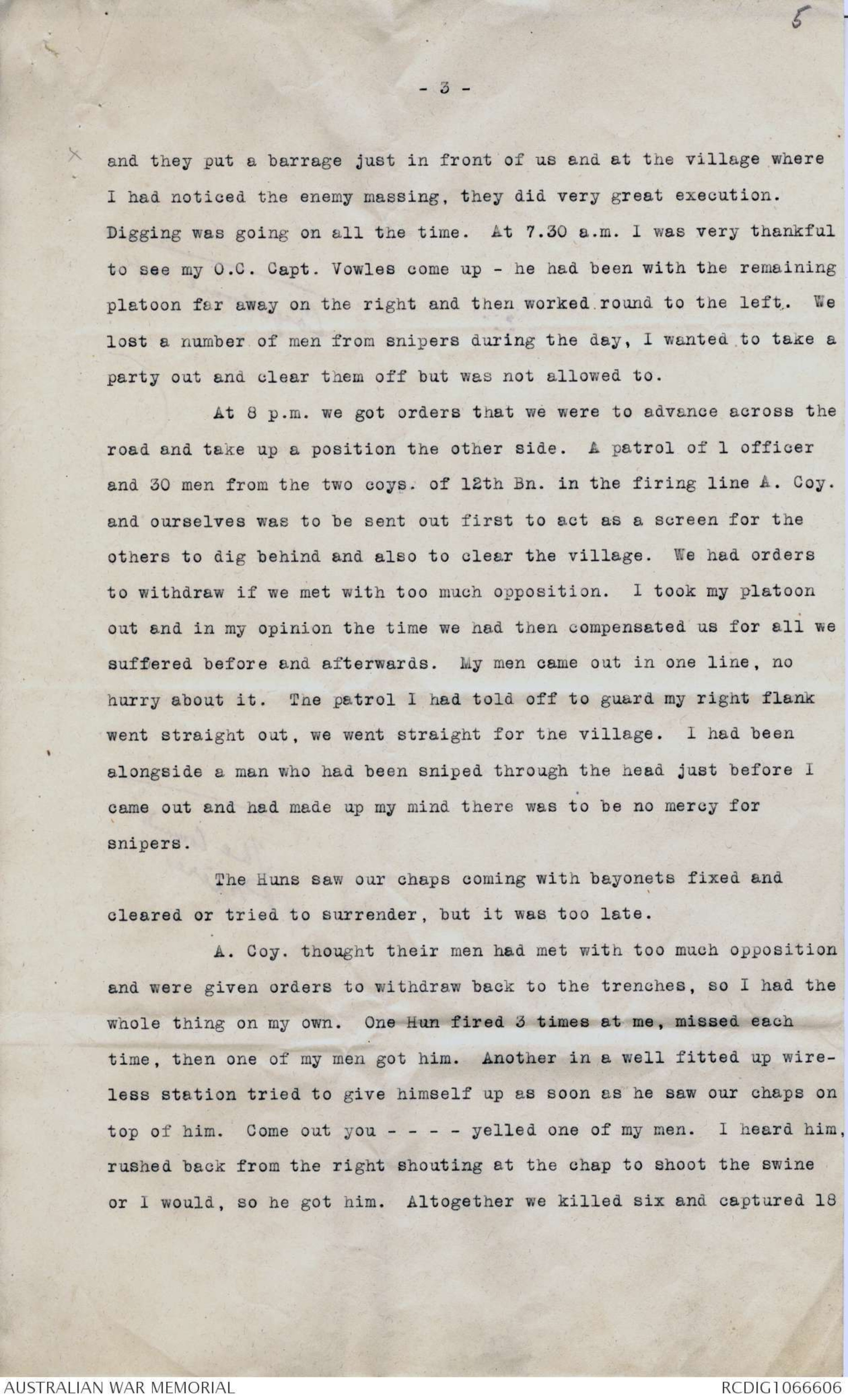
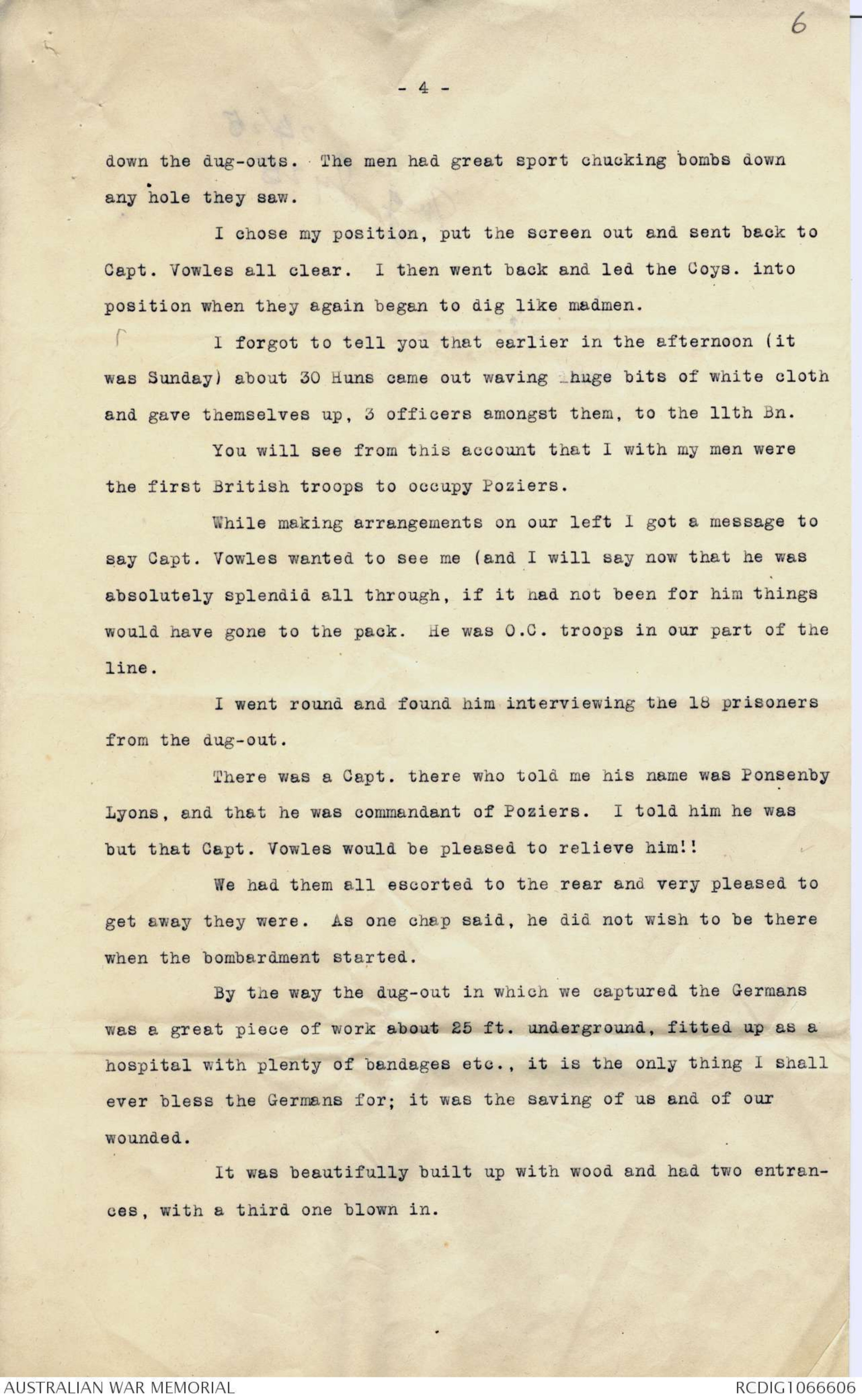
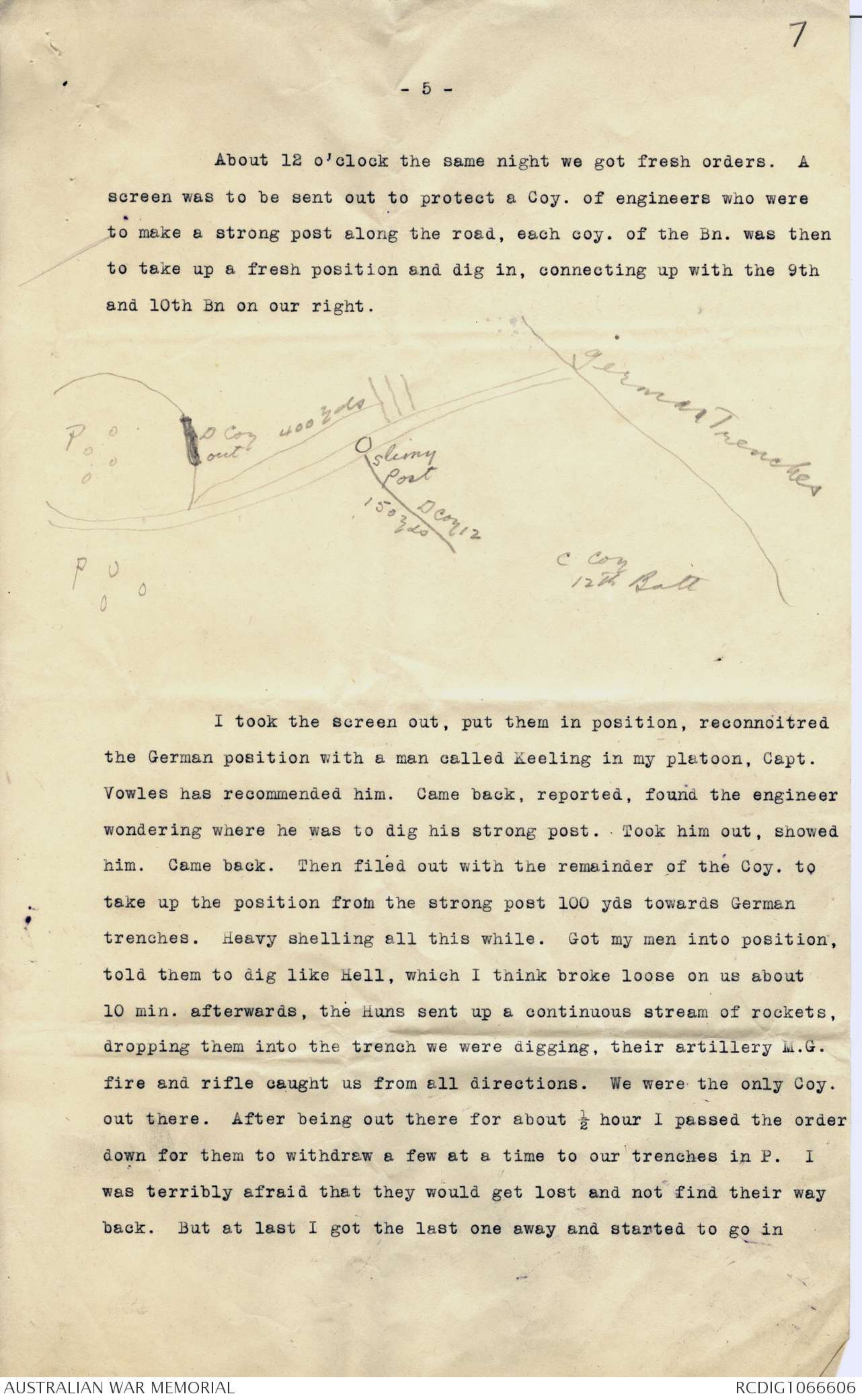
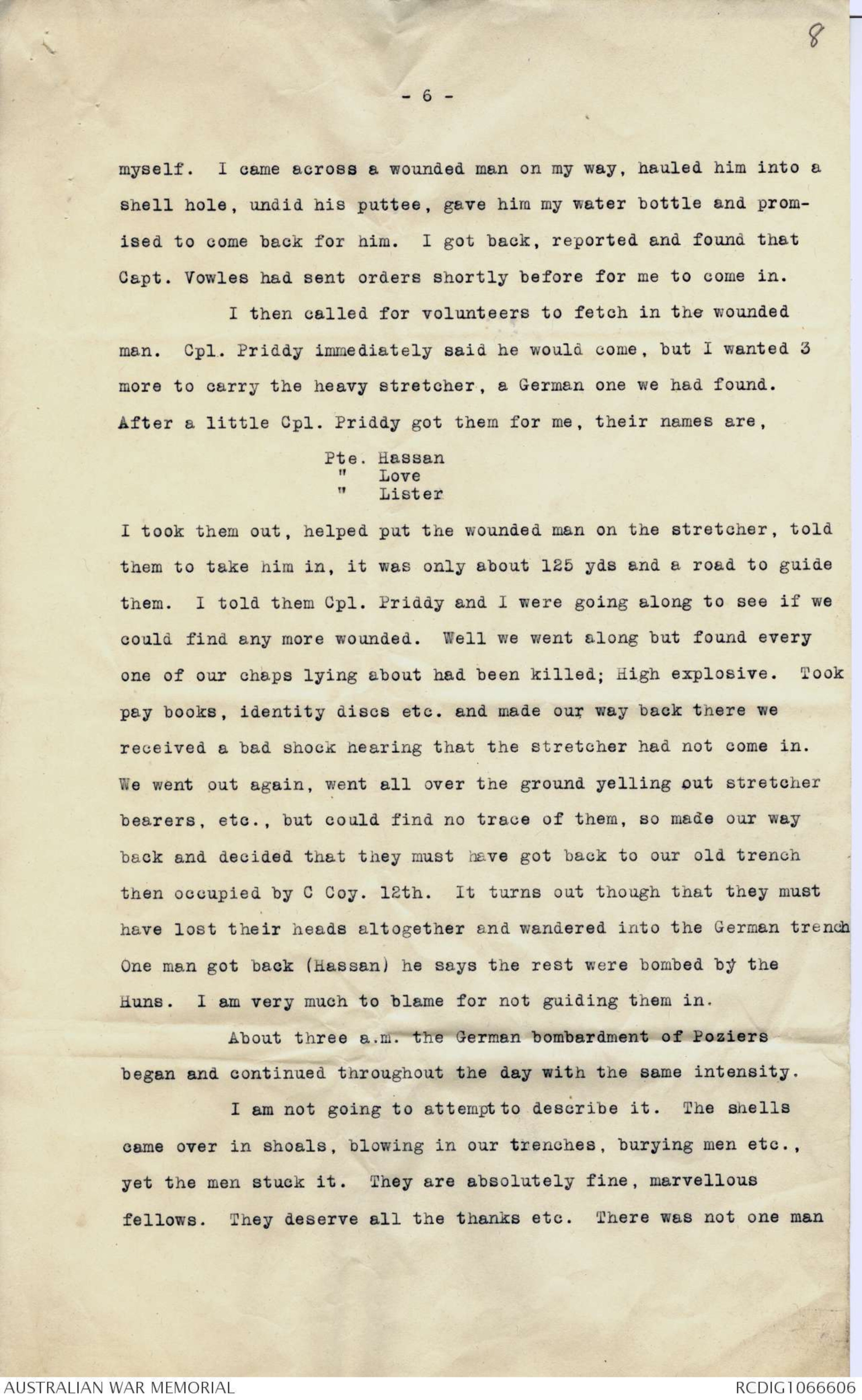
AWM38
Official History,
1914-18 War: Records of C E W Bean,
Official Historian.
Diaries and Notebooks
Item number: 3DRL606/244/1
Title: Folder, 1916 - 1933
Comprises correspondence, notes, diagrams
and other papers regarding Pozieres and
included letters from Brig Arthur Blackburn VC
and Brig Gen R L Leane.
AWM38-3DRL606/244/1
1st SET. DIARY NO. 244.
AWM38 3DRL 606 ITEM 244 [1]
DIARIES AND NOTES OF C. E. W. BEAN
CONCERNING THE WAR OF 1914 - 1918
THE use of these diaries and notes is subject to conditions laid down in the terms
of gift to the Australian War Memorial. But, apart from these terms, I wish the
following circumstances and considerations to be brought to the notice of every
reader and writer who may use them.
These writings represent only what at the moment of making them I believed to be
true. The diaries were jotted down almost daily with the object of recording what
was then in the writer's mind. Often he wrote them when very tired and half asleep;
also, not infrequently, what he believed to be true was not so - but it does not
follow that he always discovered this, or remembered to correct the mistakes when
discovered. Indeed, he could not always remember that he had written them.
These records should, therefore, be used with great caution, as relating only what
their author, at the time of writing, believed. Further, he cannot, of course, vouch
for the accuracy of statements made to him by others and here recorded. But he
did try to ensure such accuracy by consulting, as far as possible, those who had
seen or otherwise taken part in the events. The constant falsity of second-hand
evidence (on which a large proportion of war stories are founded) was impressed
upon him by the second or third day of the Gallipoli campaign, notwithstanding that
those who passed on such stories usually themselves believed them to be true. All
second-hand evidence herein should be read with this in mind.
16 Sept., 1946. C. E. W. BEAN.
AUSTRALIAN WAR MEMORIAL
ACCESS STATUS
OPEN
[*Pozieres
HN /
To be copied*]
1
11/11/21
'Abshot'
Korumburra
Sth. Gippsland
Victoria
C. E. W. Bean
Off. War Correspondent A.I.F.
Tuggranong
[*Capt W.L. Cooke
4 Bn*]
Dear Sir
I am writing ref. the first enemy
field gun captured by the Australians
in France or perhaps during the war -
and am wondering if the 77 c.m. I
stumbled across about 9. A. M on 23rd July
1916 - at the battle of Pozieres - was the
first. The spokes of one wheel were
broken - otherwise the gun was alright.
It lay in a gun pit about, X 4 d 3 Y
in Trench Map, 1/20,000 "Area of Martinpuich,"
and had been damaged during an early
bombardment. I reported the finding of
the gun to the C.O. ^Lt.Col. I.G. Mackay of my Bn. (4th)
and he instructed the Armourer Sgt. to
stamp on it "Captured by 4th Bn."
This was done with the point of a
bayonet and a hammer.
I was I/C of the 4th Bn
L.M. Guns at that time
I have commenced reading
vol. 1. of the Off. History of Aust in the War
- which has prompted me to write -
thinking the above may be of some interest.
[*Yrs truly
Wm L. Cooke
ex. Capt
4th Aust. Inf Bn*]
2.
HISTORICAL NOTES.
29 St. Roamn's Road,
SOUTHSEA,
24th Feby. 1920.
The Secretary,
Department of Defence,
Melbourne.
Dear Sir,
I yesterday received your communication requesting particulars
of my son, Lieut. E.W.D. Laing, M.C., 12th Battalion, A.I.F. I have
two interesting letters, one giving his experience of the Gallipoli
landing, the other the taking of Pozieres - for which last he gained the
Military Cross. I also enclose one letter to his Aunt - Mrs. George
Smith. There are others in the same strain from officers and privates
who knew him. He was badly wounded in the advance on Bapaume in 1917
having his nose broken and nearly losing the sight of one eye. This
was caused by a bullet as he was returning across country from which
they had driven the Germans, and he walked back to bring up reinforcements.
This was in February (if my memory serves me) - in any case he
refused to stay in England after a rapid recovery, but was in the
trenches once more in May. He was made Acting Staff Captain relieving
an officer while on leave, but preferring to return to his men, applied
to be allowed to do so as soon as these duties permitted.
When war broke out he applied for a commission; awaiting this
he was taken into the Censor's office in Perth, W.A. where he translated
German correspondence and also did Interpreter's work at H.Q., Francis
Street.
When in England he went up for Sandhurst at the age of 17 years
only failing in one subject. If he had passed he would have had to
wait, he being then under age; his going in for the exam. only being
to see where he would be.
He came out to Western Australia to which place I had been sent
to take up orcharding on my property at Maddington. He was born at
La Perouse, N.S.W. where I was stationed for some years, being myself
in the service of the Eastern Extension Telegraph Company.
He never undertook anything but he did it thoroughly - an
honourable and brave man full of thought for us and afterwards for his
men. I think the Pozieres letter speaks for itself. Capt. Love told
me he and the men thought he ought to have been given a V.C. I hear
the French Government have given Australia a piece of ground at
Pozieres, on which to erect a monument - is this true?
I shall be glad to know how and when I may obtain the
Commonwealth History of the War, and also if you can inform me if the
doings of the separate units will be published separately. Naturally
I should like to have all of these. My future address will be c/o
The National Provincial and Union Bank of England, Palmerston Road,
Southsea, Hampshire, England. I shall be grateful for information
above.
I may mention that with the exception of the Military Cross
sent me whilst I was in Penang I have not received any medals or stars
due to my son. I understand there is the Gallipoli Star, Victory
Medal and other decorations for serving from 1914 to May 1918, when he
was killed.
I beg you to see Capt. Vowles' D.S.O. report on this action
(Pozieres) to his C.O.
Yours faithfully.
(sgd) W.D. Laing.
3
[*Hist Notes
Hist Notes -
No 1 Copy*]
[*Vide Capt Vowles D.S.O.
report to O.C. on
situation in Pozieres
when he arrived, written after
their relief & return*]
COPY.
FRANCE,
30th July 1916.
Dear Dad and Mum,
Many thanks for your letters 19th and 21st June. We
have just come out of some of the fiercest fighting there has been
about here. Will try to give you some account of it.
We arrived at the reserve trenches 19th inst. after
having marched from billet to billet with perhaps a day or two's
rest at every other one.
Reserve trenches N. of Albert about 3 miles from firing
[*?Friday*] line. On the Saturday night I took a party up to our front line
to dig; and all night job. Although the other chaps had a good
many casualties I was fortunate and had none.
Next evening our job was explained to us by our Colonel
(Elliott). We were going to support the 11th if necessary to help
take 2nd objective and then push on ourselves and take 3rd objective.
We left our reserve trenches about 10.30 p.m. advanced in single
file, a hell of a march in the dark, through a communication trench.
I was bringing up the rear of our company as I was 2nd senior
officer. There were blocks and stops all the while. I had to go
along the top several times to find out what the stop was, once I
found that another party had got between our leading platoon, sat
down and thus stopped all the remainder of our coy.
At the given time our artillery opened a terrific
bombardment on the Hun and we knew the 11th would soon be into the
enemy's 1st trench; it was an anxious time as we were not even in
position. We got out of the communication trench, the other three
platoons of the coy. had gone on and I lost them in the dark so
had a look round and started off with my platoon to where I thought
the objective was. We were under heavy bombardment the whole time
with M.G. fire chucked in.
4
-2-
I lost my platoon sergeant very early, Sgt. Potts one
of the finest men I know hit through the chest I heard. Have
written to Aunt Lizzie to ask if she can find out anything about
him from any of the hospitals.
After stumbling over country broken up with shell holes
trenches etc. and changing direction several times, a difficult
operation at night and under fire; we came to a trench full of
our own chaps 9th Bn. They told me reinforcements wanted on
right, I asked them why they did not go, they said they had to stay.
Well I said as far as I know my objective (the 3rd) is straight
ahead, that is where I am going, so I gave the order 12th Bn.
prepare to advance, Advance, and the men all hopped out of the
trench and followed. About 500 yds. further on I came across a
party of men of 11th digging in so I linked up with them and put
my men on to dig like blazes. I knew our objective was just about
where we were, the main road through Pozieres The great trouble was
there was nothing on my right flank, so I gave orders for it to be
swung back.
Seeing some men in rear I learned that two other platoons
of our company were wandering about, so I sent out for them had
them guided in and set them to dig and keep on digging. These two
platoons had lost their officer (Mr Brine), he had gone out to do
some reconnoitring and had not returned.
When daybreak came we hid where my men were, a trench
facing the village (save the mark) ,with the right flank flung
back, there was a distance of 400 yds and the nearest
troop on my right.
Hand drawn diagram – see original document
Sure enough as soon as it was light enough to see the
Germans tried to get round our flank, we could see lots of them
working round - we got into them with rifle and L.M.G. fire and
did a lot of execution. I sent back a message for our artillery
5
-3-
[*X*]
and they put a barrage just in front of us and at the village where
I had noticed the enemy massing, they did very great execution.
Digging was going on all the time. At 7.30 a.m. I was very thankful
to see my O.C. Capt. Vowles come up - he had been with the remaining
platoon far away on the right and then worked round to the left. We
lost a number of men from snipers during the day, I wanted to take a
party out and clear them off but was not allowed to.
At 8 p.m. we got orders that we were to advance across the
road and take up a position the other side. A patrol of 1 officer
and 30 men from the two coys. of 12th Bn. in the firing line A. Coy.
and ourselves was to be sent out first to act as a screen for the
others to dig in behind and also to clear the village. We had orders
to withdraw if we met with too much opposition. I took my platoon
out and in my opinion the time we had then compensated us for all we
suffered before and afterwards. My men came out in one line, no
hurry about it. The patrol I had told off to guard my right flank
went straight out, we went straight for the village. I had been
alongside a man who had been sniped through the head just before I
came out and had made up my mind there was to be no mercy for
snipers.
The Huns saw our chaps coming with bayonets fixed and
cleared or tried to surrender , but it was too late.
A . Coy. thought their men had met with too much opposition
and were given orders to withdraw back to the trenches, so I had the
whole thing on my own. One Hun fired 3 times at me, missed each
time, then one of my men got him. Another in a well fitted up wireless
station tried to give himself up as soon as he saw our chaps on
top of him. Come out you - - - - yelled one of my men. I heard him,
rushed back from the right shouting at the chap to shoot the swine
or I would, so he got him. Altogether we killed six and captured 18
6
-4-
down the dug-outs. The men had great sport chucking bombs down
any hole they saw.
I chose my position, put the screen out and sent back to
Capt. Vowles all clear. I then went back and led the Coys. into
position when they again began to dig like madmen.
I forgot to tell you that earlier in the afternoon (it
was Sunday) about 30 Huns came out waving huge bits of white cloth
and gave themselves up, 3 officers amongst them, to the 11th Bn.
You will see from this account that I with my men were
the first British troops to occupy Poziers.
While making arrangements on our left I got a message to
say Capt. Vowles wanted to see me (and I will say now that he was
absolutely splendid all through, if it had not been for him things
would have gone to the pack. He was O.C. troops in our part of the
line.
I went round and found him interviewing the 18 prisoners
from the dug-out.
There was a Capt. there who told me his name was Ponsenby
Lyons, and that he was commandant of Poziers. I told him he was
but that Capt. Vowles would be pleased to relieve him!!
We had them all escorted to the rear and very pleased to
get away they were. As one chap said, he did not wish to be there
when the bombardment started.
By the way the dug-out in which we captured the Germans
was a great piece of work about 25 ft. underground, fitted up as a
hospital with plenty of bandages etc., it is the only thing I shall
ever bless the Germans for; it was the saving of us and of our
wounded.
It was beautifully built up with wood and had two entrances,
with a third one blown in.
7
-5-
About 12 o'clock the same night we got fresh orders. A
screen was to be sent out to protect a Coy. of engineers who were
to make a strong post along the road, each coy. of the Bn. was then
to take up a fresh position and dig in, connecting up with the 9th
and 10th Bn on our right.
Hand Drawn Diagram – see original document
I took the screen out, put them in position, reconnoitred
the German position with a man called Keeling in my platoon, Capt.
Vowles has recommended him. Came back, reported, found the engineer
wondering where he was to dig his strong post. Took him out, showed
him. Came back. Then filed out with the remainder of the Coy. to
take up the position from the strong post 100 yds towards German
trenches. Heavy shelling all this while. Got my men into position,
told them to dig like Hell, which I think broke loose on us about
10 mins. afterwards, the Huns sent up a continuous stream of rockets,
dropping them into the trench we were digging, their artillery M.G.
fire and rifle caught us from all directions. We were the only Coy.
out there. After being out there for about ½ hour I passed the order
down for them to withdraw a few at a time to our trenches in P. I
was terribly afraid that they would get lost and not find their way
back. But at last I got the last one away and started to go in
8
-6-
myself. I came across a wounded man on my way, hauled him into a
shell hole, undid his puttee, gave him my water bottle and promised
to come back for him. I got back, reported and found that
Capt. Vowles had sent orders shortly before for me to come in.
I then called for volunteers to fetch in the wounded
man. Cpl. Priddy immediately said he would come, but I wanted 3
more to carry the heavy stretcher, a German one we had found.
After a little Cpl. Priddy got them for me, their names are,
Pte. Hassan
" Love
" Lister
I took them out, helped put the wounded man on the stretcher, told
them to take him in, it was only about 125 yds and a road to guide
them. I told them Cpl. Priddy and I were going along to see if we
could find any more wounded. Well we went along but found every
one of our chaps lying about had been killed; High explosive. Took
pay books, identity discs etc. and made our way back there we
received a bad shock hearing that the stretcher had not come in.
We went out again, went all over the ground yelling out stretcher
bearers etc., but could find no trace of them, so made our way
back and decided that they must have got back to our old trench
then occupied by C Coy. 12th. It turns out though that they must
have lost their heads altogether and wandered into the German trench
One man got back (Hassan) he says the rest were bombed by the
Huns. I am very much to blame for not guiding them in.
About three a.m. the German bombardment of Poziers
began and continued throughout the day with the same intensity.
I am not going to attempt to describe it. The shells
came over in shoals, blowing in our trenches, burying men etc.,
yet the men stuck it. They are absolutely fine, marvellous
fellows. They deserve all the thanks etc. There was not one man
 Deb Parkinson
Deb ParkinsonThis transcription item is now locked to you for editing. To release the lock either Save your changes or Cancel.
This lock will be automatically released after 60 minutes of inactivity.